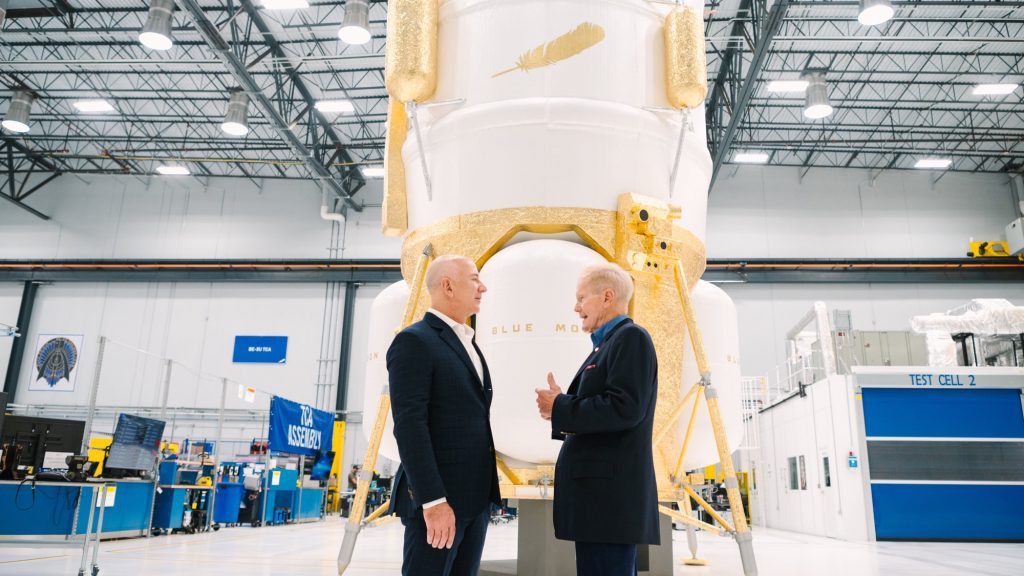WASHINGTON — Blue Origin anticipates launching the initial model of its Blue Moon lunar lander, a precursor to a future crewed lunar lander it is creating for NASA, in 2025.
In an interview on the CBS News show “60 Minutes” broadcast March 3, John Couluris, senior vice president of lunar permanence at Blue Origin, stated the company was aiming to send the first “Mark 1” version of its Blue Moon lander in as soon as a year.
“We expect this lander to touch down on the moon between 12 to 16 months from today,” he said, referring to a full-sized model of the lander behind him. “That is what our team is working towards.”
The Mark 1 lander is a cargo vehicle that is a technology demonstrator. Blue Origin revealed the mockup in October and announced at the time it intended to send its first Mark 1 lander, designated MK1-SN001, on a “Pathfinder Mission” to test key technologies such as its BE-7 engine.
“MK1-SN001 proves out critical systems, including the BE-7 engine, cryogenic fluid power and propulsions systems, avionics, continuous downlink communications, and precision landing,” the company stated at the time, but did not offer a launch date for the mission.
The company plans at minimum two flights of the Blue Moon Mark 1 lander as it works on the Mark 2 lander designed to transport people. Blue Origin secured a $3.4 billion NASA contract in May 2023 to develop that lander as part of the Human Landing System (HLS) program, to be used on the Artemis 5 mission around the end of the decade. An uncrewed demonstration of the Mark 2 lander will precede that mission.
“We are self-funding two missions of our smaller lander, Blue Moon Mark 1,” said Jacqueline Cortese, senior director of civil space at Blue Origin, during a panel discussion at the FAA Commercial Space Transportation Conference Feb. 21. “Those are really important precursors for us for our HLS missions,” testing the engine, landing sensors and other technologies.
Development of both of those Mark 1 missions is “going great,” she said then, with all of the procurements in place for them, but did not disclose a schedule for either mission. “You’ll see those missions coming up here maybe a lot faster than people realize.”
Blue Moon needs a launch on New Glenn, the rocket that Blue Origin has been developing. A first flight of the rocket is expected later this year, after several years of delays. The company has not disclosed a date for the launch but the likely payload is a NASA Mars smallsat mission called ESCAPADE, which previously has been disclosed to launch as soon as August.
Blue Origin unveiled a “pathfinder vehicle” version of New Glenn to its launch pad at Cape Canaveral Space Force Station in Florida Feb. 21, where the company carried out three fueling tests. That pathfinder vehicle included a mix of flight hardware and mockups, and lacked the seven BE-4 engines required for its first stage.
The company stated March 5 it completed the tanking tests and had moved the vehicle back to its integration facility. It did not provide an update on the vehicle’s projected first launch.









